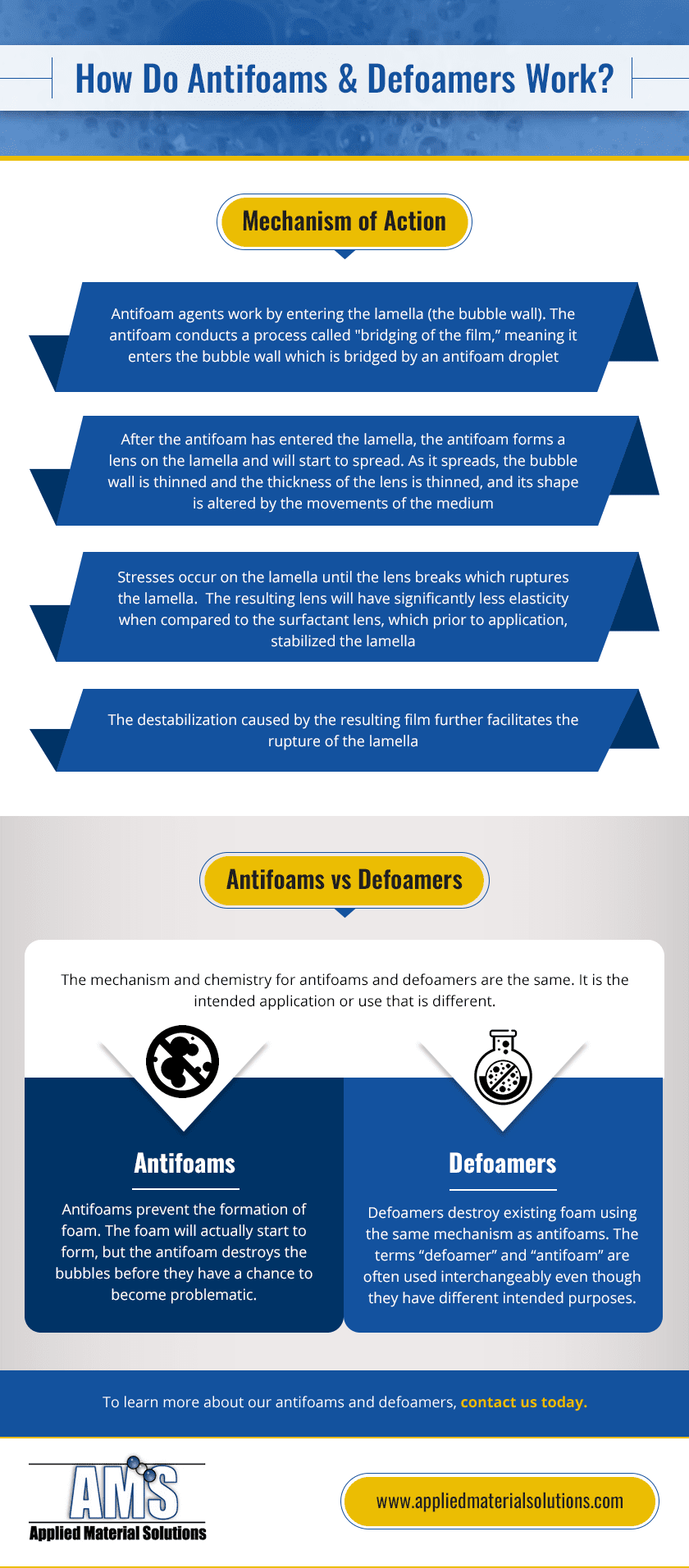The Function of Defoamers in Enhancing Product High Quality and Efficiency
In numerous manufacturing processes, the existence of foam can dramatically prevent item quality and functional performance. Defoamers act as important additives that reduce this problem, making certain smoother manufacturing workflows while improving the useful and aesthetic attributes of the last products (defoamers). Their application spans a multitude of markets, from food and beverage to drugs, where uniformity and dependability are paramount. The option of the suitable defoamer can be important to accomplishing optimal results, elevating vital questions concerning solution compatibility and performance metrics that warrant additional exploration.
Comprehending Defoamers
Recognizing the role of defoamers is important for maintaining item top quality throughout numerous markets. Defoamers are chemical ingredients created to reduce and stop the development of foam in liquid systems, which can detrimentally affect processes such as blending, filling, and surface area stress. Frothing can cause inadequacies, item issues, and compromised aesthetic allure, making defoamers an essential component in producing operations.
In industrial applications, defoamers aid to boost product consistency and stability. The effective use of defoamers not only ensures smoother manufacturing processes however likewise contributes to premium item efficiency.
Moreover, the choice and solution of a defoamer should straighten with certain application requirements, such as compatibility with various other ingredients, efficiency under differing temperature level and pH problems, and prospective regulative restrictions. Inevitably, comprehending defoamers' functions and their relevance in various formulations is vital for optimizing manufacturing and ensuring the highest possible quality final product.
Sorts Of Defoamers
Defoamers can be classified right into numerous kinds based upon their structure and device of action. The main types consist of silicone-based, non-silicone natural, and not natural defoamers.
Silicone-based defoamers are amongst the most reliable, mostly due to their ability to spread rapidly on the fluid surface and interrupt foam formation. Their special chemical structure enables for superior security, making them suitable for high-temperature applications and environments with varying pH degrees.
Non-silicone organic defoamers, commonly made up of fatty acids or all-natural oils, are valued for their biodegradability and reduced toxicity. These are usually used in food and drink applications where safety and environmental impact are critical.
Not natural defoamers, that include materials like talc or calcium carbonate, act by boosting the density of the fluid, therefore minimizing foam security. They are often made use of in industrial processes where compatibility with other materials is not a worry.
Each kind of defoamer has distinct advantages and limitations, permitting customized services depending upon the particular lathering issues run into in different applications. Recognizing these distinctions is vital for optimizing performance and accomplishing desired item top quality.
Applications Across Industries
Many markets utilize defoamers to enhance product high quality and functional performance. In the food and drink market, defoamers are crucial in procedures such as developing and dairy products manufacturing to protect against foam development, which can bring about ineffectiveness and item incongruity. By regulating foam, suppliers can make certain better yield and an extra uniform item.
In the pharmaceutical sector, defoamers play an important function in the solution of liquid drugs, where too much foam can impede mixing and exact dosing. Their usage assists maintain the stability of the formulations and promotes smoother More Help manufacturing procedures.
The paint and layers sector additionally depends on defoamers to improve the efficiency of products throughout application. By decreasing foam, these additives ensure a smoother finish and enhance the visual qualities of the end product.

Advantages of Making Use Of Defoamers
While the application of defoamers varies throughout markets, their advantages constantly improve product quality and procedure performance. One significant benefit is the reduction of foam development during producing procedures, which can or else cause manufacturing delays and incongruities in item high quality. By decreasing foam, defoamers make it possible for a smoother flow of materials, helping with more efficient procedures and minimizing the likelihood of equipment breakdowns.
Furthermore, using defoamers can boost the appearance and appearance of final items. In markets such as finishes, paints, and food handling, excessive foam can jeopardize the visual aesthetics and overall top quality, while the proper defoamer application makes certain an uniform surface and preferable features. In addition, defoamers can add to set you back financial savings by lowering waste throughout manufacturing and optimizing using basic materials (defoamers).

Selecting the Right Defoamer
Choosing the appropriate defoamer is important for optimizing production procedures and ensuring item quality. The option of defoamer affects not just the performance of foam control yet also the overall performance qualities of the end product. Aspects to take into consideration consist of the kind of application, the chemistry of the formula, and the ecological problems under which the item will certainly be made use of.
Different markets may require particular defoamer types, such as silicone-based, organic, or polymeric defoamers. Understanding the compatibility of the defoamer with the primary ingredients is necessary to prevent negative responses that could compromise item honesty. Additionally, the defoamer's effectiveness in numerous temperature levels and pH degrees should be reviewed to make certain constant performance.
Evaluating the defoamer in small useful site applications can offer beneficial insights right into its efficiency and viability. Consideration of governing compliance, particularly in food, drugs, and cosmetics, is critical in picking a defoamer. Ultimately, a detailed assessment of these aspects will certainly lead to the choice of a defoamer that not just controls foam efficiently yet additionally improves the high quality and efficiency of the final product.
Final Thought

Finally, defoamers are crucial additives that substantially boost item high quality and performance throughout various industries. By properly decreasing foam formation, these agents not only enhance operational efficiency but also add to the visual and useful honesty of items. The critical option and application of defoamers bring about set you back financial savings, maximized source usage, and increased customer satisfaction. In general, the significance of defoamers in industrial processes can not be overstated, as they play an important function in accomplishing constant and high-grade results.
Foaming can lead to inefficiencies, product problems, and endangered aesthetic charm, making defoamers an essential element in manufacturing procedures.
